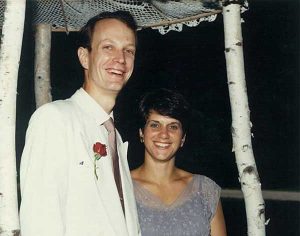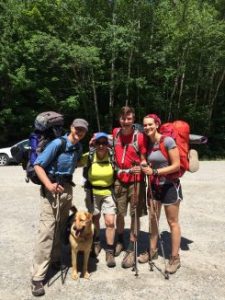
The Nature of Marriage was broadcast on Vermont Public Radio on September 1, 2009, the day that Vermont’s first-in-the-nation Marriage Equity Law went into effect, making marriage a right, not a privilege. Regardless, marriage is still hard work.
My parents were married on my mother’s twenty-first birthday—not because they were eloping, but because the year was 1946. My father, a World War II veteran taking advantage of the GI Bill to finish college, had one week off between summer school and his fall semester. My mom, who had already finished college, was about to start her first teaching job.
Because of the post-war housing shortage, the newlyweds moved into the 500-hundred square foot, one-bedroom apartment my mother was raised in. My grandparents gave the bedroom to the newlyweds and slept in the living room. My uncle slept on a cot in the kitchen. They all shared the one bath.
My mother’s parents weren’t keen on the marriage. My father was from a more religious family, and even poorer than themselves. He wore a sweater, because he didn’t own a jacket, although he must have bought one by the time they were married, because in their wedding photo, he’s wearing a suit.
The wedding was a very simple affair: my parents were married at the Democratic Party headquarters in Brooklyn, because it offered catering. Fewer than ten family members attended. While my parents honeymooned in Montreal, my maternal grandmother mailed out printed cards announcing the marriage had taken place.
My grandmother’s skepticism about the marriage lasted for the first five years, while my parents finished their educations, started their careers and traveled.
But her objections to their union subsided with the arrival of grandchildren, and her approval of my father increased with his income. The family joke is he became my grandmother’s favorite child.
Growing up, I didn’t think much about my parents marriage, just took it as a given, until my late teens, when a friend marveled how my parents were still in love.
I hadn’t noticed.
About the same time, I started to think about marriage myself, but it remained an abstract thought for another ten years. The parents of friends divorced. Couples who’d seemed secure started to split up. Marriage seemed like a losing proposition, and for a while, I crossed it off my “To Do” list.
But eventually, I did marry. My spouse and I took out a mortgage, ran a business, paid taxes and raised kids. It has not always been easy, but it keeps getting better with time. This is not just my opinion but also the conclusion of several studies that show married people are generally happier and healthier than unmarried. I certainly see it in my parents, who were married for sixty-six years.
The shared life of marriage is certainly a good way to halve sorrow and double joy, although I’ll be the first to say that maintaining a marriage can be hard work.
But that shouldn’t deter those who are willing from giving it a try. So I’m pleased that this institution from which society clearly benefits can now be enjoyed—and endured—by all loving adults in Vermont.
You can listen to the original broadcast here.

Even though I’m attempting a through-hike of Vermont’s Long Trail, you can still receive An Essay Every Wednesday emailed directly to your inbox – just subscribe. It’s easy: enter your email in the subscription box and then confirm your subscription. It’s entertaining, educational, and it’s free.
My husband passed away this March after almost 32 years of marriage. Hospice gave me a lot of information to help. The one thing which was so true & stuck with me was that after a long marriage when 1 partner dies the other can have physical symptoms of loss. This was true for me. The physical feeling has left now but the emotional loss I am sure will be with me until I can join him.
Wendy, I’m so sorry for your loss and so moved by how you’re processing and articulating your grief. Thank you for sharing your journey. All best, Deborah.
Wendy, I’m so sorry for your loss and so moved by how you’re processing and articulating your grief. Thank you for sharing your journey. All best, Deborah.